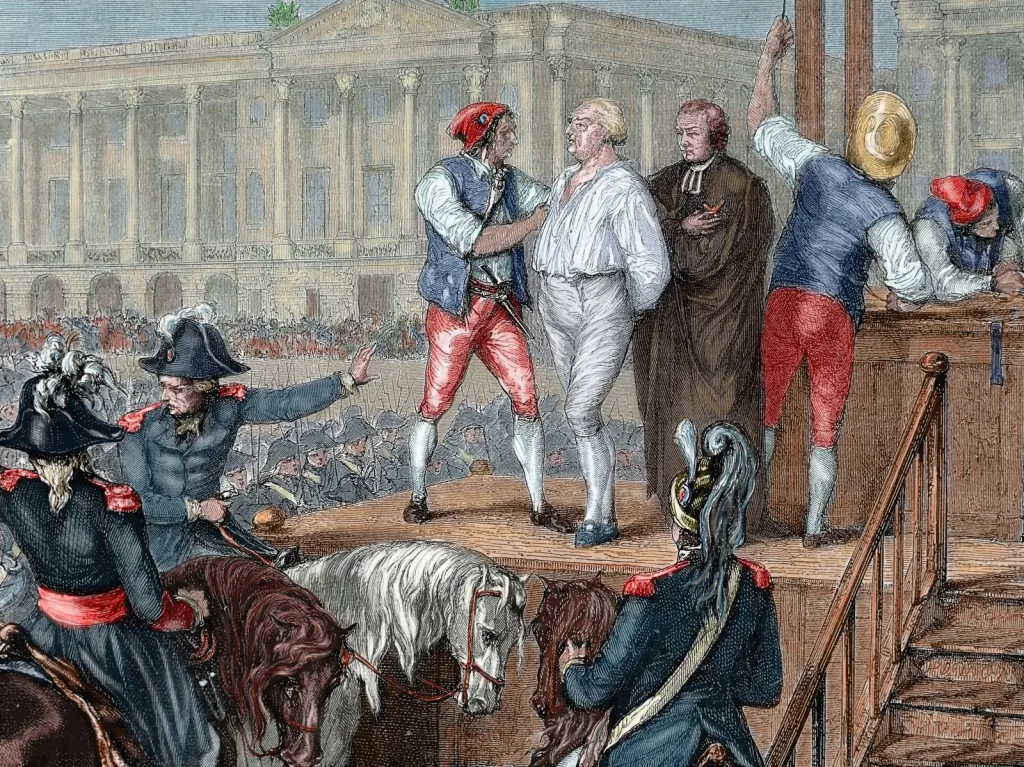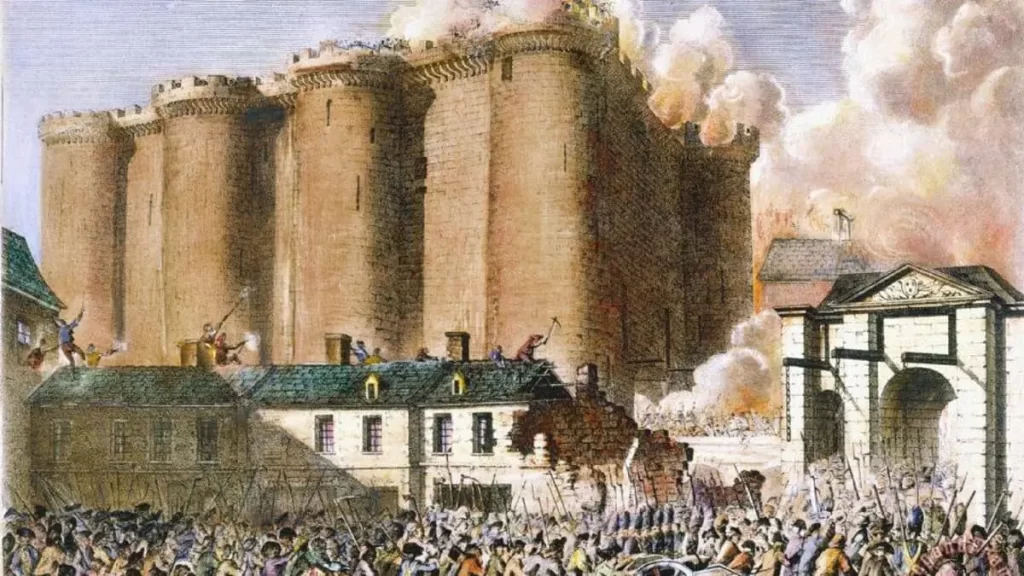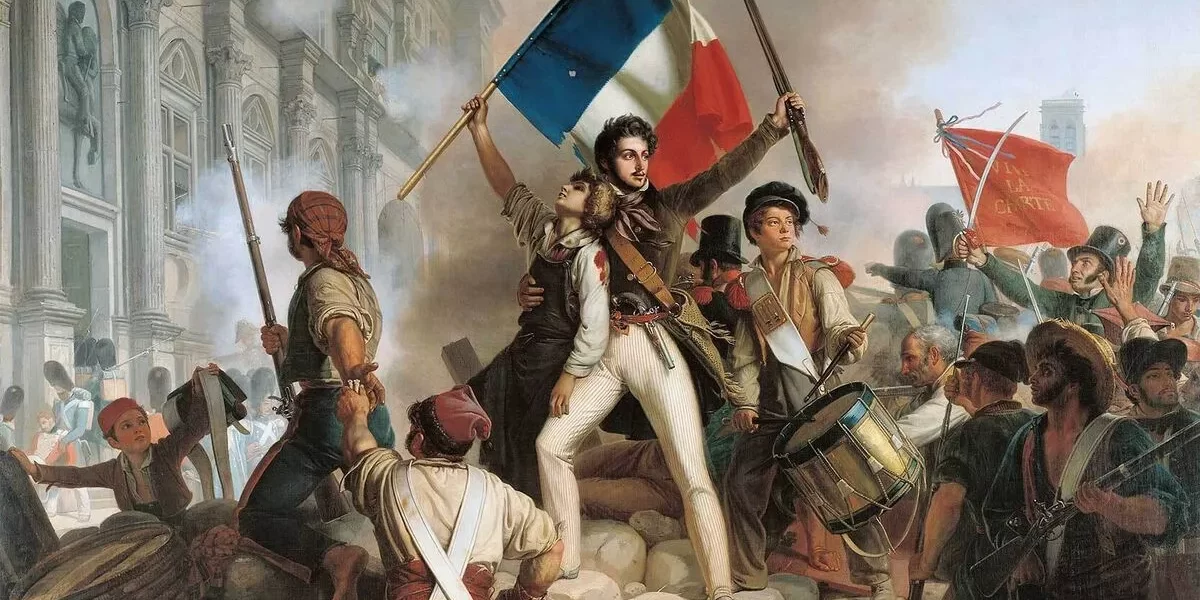The French Revolution: In the late 18th century, France was a nation on the brink of collapse. The country’s economy was in shambles, with a widening gap between the wealthy elite and the impoverished masses. The extravagant spending of the French monarchy, led by King Louis XVI, had left the government deeply in debt, and the people were struggling to make ends meet.
Adding to the economic woes, a series of poor harvests had led to widespread famine and suffering among the lower classes. The peasants, who made up the majority of the population, were burdened by heavy taxes and a feudal system that kept them in a state of virtual serfdom. Meanwhile, the privileged classes, including the nobility and the clergy, enjoyed vast wealth and power, while contributing little to the country’s coffers.
This stark contrast in social and economic status fueled a growing resentment among the people, who began to question the legitimacy of the monarchy and the entire social order. The ideas of the Enlightenment, which emphasized individual rights, reason, and the pursuit of liberty, had also taken root in France, inspiring a new generation of intellectuals and revolutionaries to challenge the status quo.
The Estates-General and the National Assembly
In 1789, the growing unrest and discontent finally boiled over. King Louis XVI, facing a severe financial crisis, convened the Estates-General, a legislative body composed of representatives from the three estates: the clergy, the nobility, and the commoners. The commoners, known as the Third Estate, were determined to assert their political power and demand reforms.
When the king refused to grant the Third Estate equal voting rights, they responded by declaring themselves the National Assembly and swearing the “Tennis Court Oath,” vowing not to disperse until a new constitution had been established. This bold act of defiance marked the beginning of the French Revolution.
The National Assembly, led by figures like the Marquis de Lafayette and the Abbé Sieyès, quickly began to enact sweeping reforms. They abolished the feudal system, abolished the privileges of the nobility, and declared that all citizens were equal before the law. The assembly also issued the Declaration of the Rights of Man and of the Citizen, which enshrined the principles of liberty, equality, and the sovereignty of the people.
The Storming of the Bastille
The revolution took a dramatic turn on July 14, 1789, when a crowd of Parisians stormed the Bastille, a fortress and symbol of the absolute power of the French monarchy. This event, which became known as the Storming of the Bastille, was a pivotal moment in the revolution, signaling the people’s determination to overthrow the old order and establish a new, more equitable system.
The capture of the Bastille was a powerful symbolic victory, but it also marked the beginning of a period of intense political and social upheaval. The revolutionary fervor spread quickly throughout France, as peasants and workers rose up against the privileged classes, seizing land and property and demanding greater rights and representation.
The National Assembly, now known as the National Constituent Assembly, continued to enact sweeping reforms, including the abolition of the feudal system, the establishment of a new system of taxation, and the reorganization of the Catholic Church. The assembly also abolished the privileges of the nobility and the clergy, and declared that all citizens were equal before the law.

The Reign of Terror
As the revolution progressed, however, it became increasingly radicalized, giving rise to a period known as the Reign of Terror. Led by figures like Maximilien Robespierre, the Jacobins, a group of radical revolutionaries, sought to purge the country of “enemies of the revolution” through a campaign of mass executions.
The Reign of Terror was a dark and bloody chapter in the history of the French Revolution, with thousands of people, including the king and queen, being executed by guillotine. The revolutionary government also sought to eradicate all traces of the old regime, including the Catholic Church, and replace them with a new, secular order based on the principles of liberty, equality, and fraternity.
Despite the brutality of the Reign of Terror, the revolution continued to inspire people around the world, who saw in it a beacon of hope for a more just and equitable society. The ideals of the revolution, including the Declaration of the Rights of Man and of the Citizen, would go on to influence the development of modern human rights and democracy.
The Rise of Napoleon Bonaparte
As the Reign of Terror subsided, a new figure emerged on the French political scene: Napoleon Bonaparte. A brilliant military strategist and a skilled politician, Napoleon seized power in a coup d’état in 1799 and declared himself the First Consul of the French Republic.
Napoleon’s rise to power marked a significant shift in the direction of the French Revolution. While he maintained many of the revolutionary ideals, such as equality before the law and the abolition of feudalism, he also sought to consolidate his own power and establish a new imperial dynasty.
Under Napoleon’s rule, France experienced a period of unprecedented military expansion and political stability. The Napoleonic Code, a comprehensive system of laws, was introduced, and the country’s infrastructure was modernized. However, Napoleon’s ambition and desire for conquest also led to a series of costly wars that ultimately contributed to the downfall of his empire.
Impacts of the French Revolution on France
The French Revolution had a profound and lasting impact on France, both politically and socially. The overthrow of the monarchy and the establishment of a new, more democratic system of government laid the foundations for the modern French state. The principles of liberty, equality, and fraternity became the guiding ideals of the nation, and the revolution’s legacy can still be seen in the country’s institutions and cultural identity.
The revolution also had a significant impact on the role of the Catholic Church in France. The church’s power and influence were greatly diminished, and it was forced to cede much of its land and wealth to the state. This separation of church and state would have lasting implications for the country’s religious and cultural landscape.
The French Revolution also had a profound impact on the country’s social structure. The abolition of the feudal system and the privileges of the nobility paved the way for the rise of a new middle class, which would play a crucial role in shaping the political and economic landscape of France in the 19th and 20th centuries. The revolution also led to the emancipation of the peasantry, who were granted greater rights and freedoms than they had enjoyed under the old regime.

Influence of the French Revolution on Europe and the World
The impact of the French Revolution was not limited to France alone. The revolutionary ideals of liberty, equality, and fraternity resonated across Europe and the world, inspiring oppressed peoples to rise up against their own tyrannical rulers.
The French Revolution had a particularly profound impact on neighboring countries, such as the Netherlands, Belgium, and the German states, where the revolutionary armies of Napoleon brought the principles of the revolution with them. The overthrow of the old feudal orders and the establishment of more democratic systems of government in these regions were direct consequences of the French Revolution.
Beyond Europe, the situstoto also had a significant impact on the development of modern human rights and democracy. The Declaration of the Rights of Man and of the Citizen, which was inspired by the American Declaration of Independence, became a model for other nations seeking to establish their own systems of government based on the principles of individual liberty and popular sovereignty.
The French Revolution also played a crucial role in the development of modern nationalism, as the idea of a nation-state based on the will of the people rather than the divine right of kings took hold across the continent. This, in turn, led to the rise of nationalist movements and the eventual unification of many European nations, such as Italy and Germany, in the 19th century.
Legacy of the French Revolution
The French Revolution has left an indelible mark on the world, with its ideals of liberty, equality, and fraternity continuing to inspire people to this day. The principles of the revolution, such as the sovereignty of the people, the separation of church and state, and the abolition of feudalism, have become integral to the modern conception of democracy and human rights.
The legacy of the French Revolution can be seen in the establishment of democratic institutions and the promotion of individual freedoms in countries around the world. The Declaration of the Rights of Man and of the Citizen, for example, has been a model for countless other declarations and constitutions, including the Universal Declaration of Human Rights adopted by the United Nations in 1948.
The French Revolution has also had a lasting impact on the arts and culture. The revolutionary spirit of the time inspired a new generation of artists, writers, and thinkers, who sought to capture the energy and ideals of the movement. From the neoclassical paintings of Jacques-Louis David to the romantic literature of Victor Hugo, the French Revolution left an indelible mark on the cultural landscape.
Today, the French Revolution continues to be a subject of intense study and debate, with historians and scholars exploring its causes, its impact, and its lasting legacy. The revolution’s enduring influence is a testament to the power of the human spirit to challenge the status quo and fight for a more just and equitable world.
Final Thoughts
The French Revolution was a transformative event that reshaped the course of history, not only in France but across the globe. The ideals of liberty, equality, and fraternity that were forged in the crucible of the revolution have become the cornerstones of modern democracy and human rights.
From the storming of the Bastille to the rise and fall of Napoleon Bonaparte, the French Revolution was a complex and multifaceted event that continues to captivate the imagination of people around the world. Its legacy can be seen in the political, social, and cultural institutions that have been shaped by its ideals, and in the ongoing struggle for justice and freedom that it has inspired.
As we reflect on the legacy of the French Revolution, we are reminded of the power of the human spirit to challenge the status quo and fight for a better future. The revolution’s enduring influence serves as a testament to the enduring power of the ideals of liberty, equality, and fraternity, and a reminder that the pursuit of a more just and equitable world is a never-ending journey.
Also read: Bose Speaker: Unleash Superior Sound and Transform Your Audio Experience











